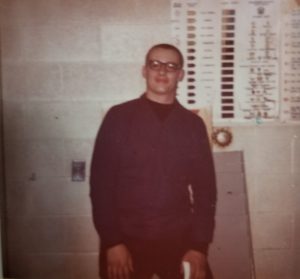Family of Sedley Alley, Executed in 2006, Petitions Court for DNA Testing of Evidence in Tennessee Case
05.01.19
(Memphis, TN) Today, April Alley, the daughter of Sedley Alley, announced she is petitioning the Criminal Court for Shelby County, Tennessee, in Memphis for post-conviction DNA testing of the evidence in her father’s case. Ms. Alley is also asking Governor Bill Lee to use his executive authority to order DNA testing of the untested evidence.
Tennessee executed Sedley Alley in 2006 after he was convicted for the 1985 rape and murder of Marine Lance Corporal Suzanne Marie Collins. DNA evidence from the crime scene was not tested in 1985 and has never been tested. Barry Scheck, co-founder of the Innocence Project and Vanessa Potkin, post-conviction litigation director for the Innocence Project represent Ms. Alley.
Read the Petition for Post-Conviction DNA Relief here.

Sedley Alley in the Navy. Photo courtesy of the Alley family.
Read the Letter to Governor Lee here.
Stand with April Alley and sign the petition for DNA testing in her father’s case here.
Watch the livestream of a press conference with April Alley, Barry Scheck, Vanessa Potkin as well as Sabrina Butler and Ray Krone, who are members of Witness to Innocence and were exonerated from death row, will begin at 11:00 a.m.
“It’s too late for my father, but it’s not too late to find the truth.” April Alley
“I just want the truth. The DNA evidence should have been tested before my father was executed. It’s too late for my father, but it’s not too late to find the truth. The court or Governor Lee should order DNA testing,” said Ms. Alley, who is the executor of her father’s estate.
“There has never been a full and fair hearing on Mr. Alley’s guilt or innocence. This case has all the tell-tale signs of a wrongful conviction – a confession that has been demonstrated to be false by objective forensic evidence, mistaken eyewitness identification, and, most disturbing, the refusal to test DNA evidence that could have exonerated Mr. Alley or removed the doubts about his guilt,” said Mr. Scheck.
In 2006, on the eve of Mr. Alley’s execution, the Tennessee Board of Parole recommended that then-Governor Bredesen stay Mr. Alley’s execution and order DNA testing. Instead of exercising his power to order DNA testing, the governor directed Mr. Alley’s defense team to present their request for testing to the Tennessee courts.
“The court or Governor Lee should order DNA testing.” April Alley
Many items of evidence were presented for testing, including men’s red underwear that the police believed was worn by the murderer found near the victim’s body. Then-available DNA testing might have excluded Mr. Alley as the perpetrator or provided a match with another man in the CODIS DNA database. The Tennessee courts incorrectly ruled that Mr. Alley was not entitled to DNA testing, even if the testing could produce a match to a third party with a history of committing similar offenses. Five years later, the Tennessee Supreme Court expressly overruled Mr. Alley’s case in State v. Powers and clarified that Tennessee’s post-conviction DNA statute intended to allow a defendant to prove innocence by comparing DNA from a defendant to DNA from other potentially guilty people, including hits from the CODIS DNA databank. (Read Powers ruling here.)
“The courts got it wrong in 2006 when they allowed Mr. Alley to be executed before testing the DNA. If Mr. Alley were alive today, he would be entitled to DNA testing under the Powers ruling and the plain language of the post-conviction DNA analysis statute. We now have a chance to learn the truth in this case,” added Mr. Scheck.
Add your name: Stand with Sedley Alley and the search for the truth
The Petition for post-conviction DNA relief details how a reinvestigation of the case over the years has shown that the evidence against Mr. Alley was weak.
“There has never been a full and fair hearing on Mr. Alley’s guilt or innocence.”Barry Scheck
For example, Dr. Richard Leo, an expert in false confessions, has analyzed the case and determined that Mr. Alley’s confession was likely false. Key details in Mr. Alley’s statement about how the crime was committed do not match the forensic evidence. For instance, Mr. Alley’s confession states that he hit the victim with his car. Autopsy records show that Ms. Collins was not hit by a car. (Petition at p. 5.) Mr. Alley’s confession states that he stabbed Ms. Collins in the head with a screwdriver. Autopsy records show that she was not stabbed in the head with a screwdriver. Mr. Alley told his daughter that he was coerced into confessing. He was highly intoxicated on the night of the crime, had no recollection of committing the crime, and did not believe he had done it.
Other physical evidence from the crime scene and eyewitness accounts do not match Mr. Alley. For example, the tire tracks found at the crime scene were not from Mr. Alley’s car. Recovered shoe prints were not from Mr. Alley’s shoes. A key witness’s description of a man with a station wagon where Ms. Collins was abducted described that man as 5’ 6-8” tall with short brown hair and a dark complexion. Mr. Alley was 6’4” tall, had red, medium-long hair, and a light complexion. (Petition at p. 5.)
The Innocence Project began looking for evidence in this case again because they recently received a tip from law enforcement that someone who was indicted for a brutal murder and sexual assault in another state might be the actual perpetrator in the Alley case. This person went to the same military school as the Tennessee victim in the time leading up to the crime. There is also evidence about a jilted boyfriend who was an alternate suspect. (Petition at p. 3 fn 1, p. 4.)
“The public’s interest in having the right defendant brought to justice extends beyond the life of a single defendant. If Tennessee executed the wrong person in 2006, the actual perpetrator may still be free to harm other people. This is a matter of public safety,” said Mr. Scheck.
The Innocence Project, founded in 1992 by Peter Neufeld and Barry Scheck at Cardozo School of Law at Yeshiva University, exonerates the wrongly convicted through DNA testing and reforms the criminal justice system to prevent future injustice.
Add your name: Stand with Sedley Alley and the search for the truth
Leave a Reply
Thank you for visiting us. You can learn more about how we consider cases here. Please avoid sharing any personal information in the comments below and join us in making this a hate-speech free and safe space for everyone.
October 30, 2019 at 9:35 am
October 23, 2019 at 8:07 am
Why did he admit his guilt if he was innocent? I dont believe he is innocent for one second. Don’t get me wrong, I’m all for reviewing most cases. In this case, he confessed. In my heart, I believe he’s guilty and justice was served.

Ridiculous. Sedley gave a confession where he clearly admitted killing Collins but his confession involved lies meant to show he did not mean to kill her. He said he hit her with his car, and then offered up the screwdriver lie. Both were untrue. Then he admitted he tried to stage a sex crime scene (which was his actual crime), and just happened to brush his had on a tree limb, which he inserted inside her etc. Autopsy showed she was alive when violated with the tree limb, and that it had been pushed in and out 3 or 4 times. His legal team was top flight, and decided to go with an insanity defense; Bogus multiple personality Disorder claims. All of you should be deeply ashamed.